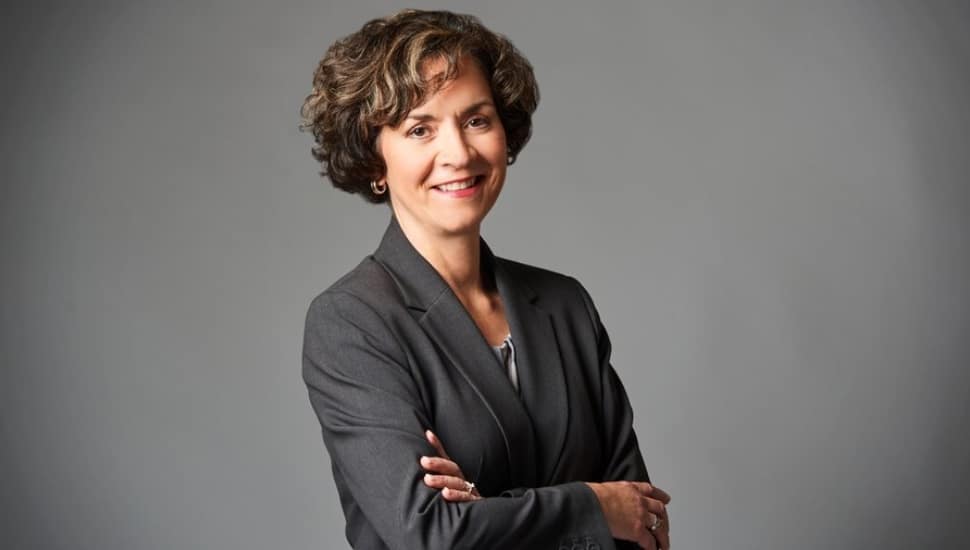The Transformative Power of Community Colleges and Democratizing Education: Q&A with DCCC’s President

A first-generation college student born of immigrant parents, Marta Yera Cronin, Ed.D., has served in community colleges for more than two decades.
Since assuming the presidency of Delaware County Community College (DCCC) in July 2023, she has focused on providing increased accessibility to education for students in eastern Delaware County and Chester County and introduced new career-oriented dual enrollment programs for high school students.
Prior to DCCC, she served for five years as President of Columbia Gorge Community College in The Dalles, Ore., and in administrative and faculty roles at Indian River State College in Fort Pierce, Fla. She serves on the boards of the Chester County Economic Development Council and the Riverfront Alliance of Chester County. She earned her doctorate of Education at the University of Sarasota.
In this Q&A, Cronin shares what she’d like the business community to know about DCCC and the “transformative power of community colleges.”
Why are you personally enthusiastic about being president of a community college, and what are some of your priorities for the 2024-2025 academic year?
Cronin: As President of DCCC, I am deeply passionate about the transformative power of community colleges. My enthusiasm stems from the unique role that institutions like DCCC play in providing accessible, high-quality education to a diverse student body. Community colleges are at the forefront of democratizing education, offering opportunities to students from all walks of life.
For the 2024-2025 academic year, my priorities include enhancing interdisciplinary collaboration, expanding our program offerings in high-demand fields like AI and Cloud Computing, and ensuring our financial practices are robust and transparent. Additionally, I am committed to fostering a culture of continuous improvement, where innovation is encouraged, and every member of our community feels valued and empowered to contribute to our shared success. Finally, I am deeply committed to expanding equitable access to the college by offering the courses, programs, and services needed to meet the academic and workforce training needs of the diverse communities we serve.
Why should prospective students in the region choose to begin or resume their higher education journey at Delaware County Community College?
Cronin: Prospective students should choose Delaware County Community College due to its strong reputation for providing accessible, high-quality education tailored to the needs of the community. According to a July 2024 Gallup/Lumina Foundation report, community colleges like DCCC enjoy greater public confidence compared to four-year institutions. This trust is rooted in their practical, student-centered approach to education, which emphasizes affordability, flexibility, and direct pathways to employment or further education.
At DCCC, students benefit from smaller class sizes, personalized attention, and a wide array of programs designed to meet the demands of today’s job market. Whether students are seeking to transfer to a four-year university or enter the workforce immediately, DCCC provides the resources and support necessary to achieve their goals. The college also prides itself on creating an inclusive environment that fosters a sense of belonging and community among its diverse student body.
We are committed to affordability. The college offers different financial aid options, including federal and state grants, scholarships, work-study, and other programs. We offer scholarships tailored to particular fields of study. For example, our Kelleher Connect Career Opportunity Fund is a scholarship designed for students in specific technical education programs who plan to enter the workforce following program completion.
What are a few DCCC programs that are particularly well-aligned with the needs of future employers?
Cronin: DCCC offers several programs that align closely with the needs of future employers, particularly in high-demand fields. For example, the college’s offerings in Workforce High Priority Occupation (HPO) Programs are specifically designed to prepare students for roles in industries that are experiencing significant growth. These programs include Teacher Education, which prepares students for roles in K-12 education, and Cloud Computing, which equips students with skills in a rapidly expanding tech field. Our Advanced Manufacturing Program is a pathway to careers in architecture, industrial systems, computer numeric control, machine tool technology, process control technology, and more.
Additionally, DCCC is developing new programs in artificial intelligence (AI), reflecting the increasing importance of AI across various sectors. These programs are designed to provide students with the technical knowledge and practical experience needed to succeed in the evolving job market, where AI is becoming an integral part of many industries.
What are some of the existing relationships DCCC has with Philadelphia-area employers, and how do you recommend that employers connect with the college?
Cronin: DCCC has established strong partnerships with a variety of employers in the Philadelphia area, which helps to ensure its programs remain relevant and responsive to industry needs. These partnerships enable the college to offer students hands-on experiences, internships, and networking opportunities that can lead directly to employment.
For example, this past summer we had several DCCC students conducting advanced biomedical research at Philadelphia’s The Wistar Institute after being selected for its highly competitive Biomedical Technician Training Program, a paid, credit-earning 12-week apprenticeship program.
Employers looking to connect with DCCC can do so through the college’s Workforce Entry Center and other career development programs such as our Student Employment Services and Co-Op Center. The latter works with a wide range of employers to match well-qualified students with cooperative education and internship opportunities. These centers facilitate collaborations between the college and businesses, providing a platform for employers to engage with students and faculty. Employers are encouraged to participate in advisory boards, offer internships, and engage in curriculum development to help shape the future workforce.
DCCC is the community college of both Delaware and Chester Counties. How has the College increased (or is planning to increase) its offerings at its Chester County locations? What role do those locations — along with the upcoming new Southeast Center in Upper Darby Township — play in the college’s mission to reach underserved populations?
Cronin: DCCC has been actively expanding its presence in Chester County to better serve the educational needs of the region. The college is planning to launch new programs, including culinary arts classes in Phoenixville by January 2025, to meet the growing demand for specialized skills in the county.
Our 46,000-square-foot Downingtown Center is centrally located in Chester County and boasts a 16,000-square-foot STEM wing and a state-of-the-art Allied Health and Nursing Simulation Lab. Students can complete the full Business Administration, Liberal Arts, and Psychology Majors at the Downingtown Center. Other popular program offerings include Computer Science, Education, Engineering, Health Studies (pre-nursing), Network Engineering, and Nursing (RN).
Our Pennocks Bridge Center in West Grove extends our reach even farther into Chester County and, like our other centers and our Marple Campus, serves high school dual enrollment students as well as those who have already graduated from high school.
Additionally, the new Southeast Center located on the site of the former Archbishop Prendergast High School, is set to open in January 2026. This new academic center will play a crucial role in reaching underserved populations in Delaware County, offering a range of programs designed to provide educational opportunities to those who might not otherwise have access.
Learn more at Delaware County Community College. With over 80 degree and certificate programs; 30 transfer partners; five locations; and faculty and staff who truly care about your success, Delaware County Community College provides unmatched educational value.
Join Our Community
Never miss a Delaware County story!
"*" indicates required fields




![95000-1023_ACJ_BannerAd[1]](https://delco.today/wp-content/uploads/sites/3/2023/03/95000-1023_ACJ_BannerAd1.jpg)



























